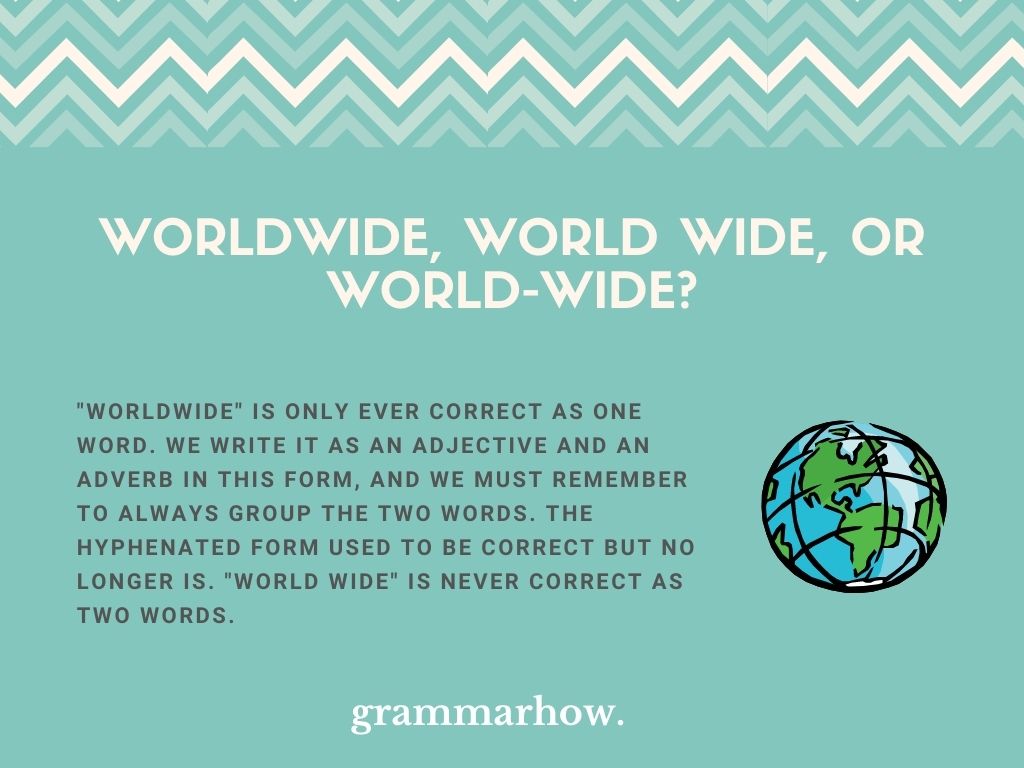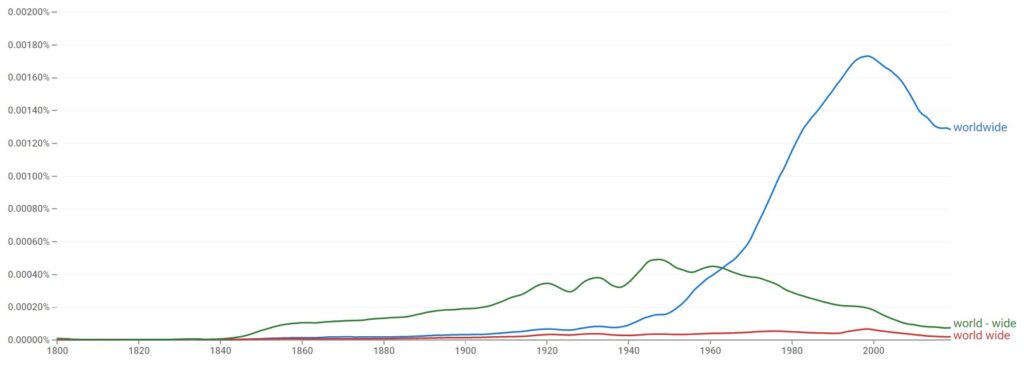We need to make sure we know how to write “worldwide” before including it in our writing. This article will explore whether it’s one or two words. There’s also the hyphenated form which we need to mention.
World wide vs. World-wide vs. Worldwide
“Worldwide” is only ever correct as one word. We write it as an adjective and an adverb in this form, and we must remember to always group the two words. The hyphenated form used to be correct but no longer is. “World wide” is never correct as two words.

According to Google Ngram Viewer, “worldwide” is the only correct choice of the three. You can tell this based on how much more popular it is in English.

Incidentally, you can also see that “world-wide” used to be the most popular choice. There was a transition in the 1960s, which meant the hyphen was finally dropped, but it was the most common choice before then.
The Cambridge Dictionary and The Oxford Dictionary define “worldwide” as one word. This shows that it’s the only grammatically correct variation, and it should be the only one you use.
Is “Worldwide” One Word?
“Worldwide” is correct as one word. We use it in this form because it’s the simplest way to write the adjective or adverb forms. We can use it in this way whenever we are modifying another noun or verb in the sentence.
“World-wide” used to be hyphenated according to the AP Style rules about using hyphens as linkers. However, as English evolved, it made more sense to completely drop the hyphen in favor of simplicity.
Now, only “worldwide” is the acceptable choice. Every native speaker will use this one in place of any other.
Here are some examples of how you can make it work:
- Do you know anybody who has a worldwide grasp like he does?
- It’s not quite a worldwide company yet, but I’m certainly working on it.
- This is a worldwide operation, and it’s very important to me.
- It’s a worldwide job, so you’re going to need to be fluent in a few extra languages!
Is “World wide” Two Words?
“World wide” is never correct as two words. We must only use it as an adjective or adverb, meaning that we must group the words somehow. Leaving them separate in “world wide” would mean that “world” modifies “wide,” which is not the meaning we’re looking for.
Check out these examples to show off the difference:
- Correct: I haven’t got the worldwide web under my control yet.
- Incorrect: It’s a world wide event, and I think it would be helpful for your business if you attended.
- Correct: It’s not a worldwide contract, but we’re working on getting other companies involved.
- Incorrect: I know plenty of people world wide! I’m happy to call them my friends.
Is “World-wide” Hyphenated?
“World-wide” is incorrect. It used to be the only option since we would group “world” and “wide” into a compound adjective. However, with the increasing popularity of the internet, “worldwide” quickly transitioned into the simpler one-word option.
AP Style rules used to allow us to hyphenate the word. It was common for us to refer to the AP Stylebook when we wanted to link two or more words that modified the same noun in a sentence.
These rules applied to “world-wide” until we dropped the hyphen completely.
Here are a few examples to help you with it:
- Correct: I have a lot of worldwide contacts that would be more than happy to work on this with me.
- Incorrect: You have a world-wide address to make, which I don’t envy you about.
- Correct: The worldwide web has created many avenues for us, and we must make the most of them.
- Incorrect: Have you got world-wide grasp anymore? I don’t think you’re as powerful as you seem to think you are.
Is “Wide” Capitalized In The Word “World-Wide”?
While “world-wide” used to be correct, it is no longer the case. Therefore, there is no reason for us to learn how to capitalize both parts of the hyphenated form.
Instead, we want you to remember that “worldwide” is the only correct form. Capitalizing it is easy since you would only capitalize the “W” if you start a sentence with it or include it in your titles.

Martin holds a Master’s degree in Finance and International Business. He has six years of experience in professional communication with clients, executives, and colleagues. Furthermore, he has teaching experience from Aarhus University. Martin has been featured as an expert in communication and teaching on Forbes and Shopify. Read more about Martin here.
